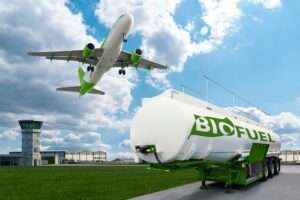Full throttle

The first flight using bio-aviation fuel took off in 2008 - it was flown by Virgin Atlantic from London to Amsterdam. Since then, many more airlines have carried out flights using bio-aviation fuels.
In 2009, the EU Emission Trading System (EU ETS) which sets a cap on how much CO2 can be emitted by different sectors, impacted on aircraft operations. Until 2012, operators were just gathering data and preparing mandated “plans” to govern their future compliance.
Beginning January 1, 2012, however, aircraft operations became subject to EU-ETS compliance.
SAF uptake
Related to that, the airline industry formed the Sustainable Aviation Fuel Users Group (SAFUG).
To date, some 15% of aviation fuel stakeholders have joined SAFUG and signed a pledge to work on SAF.
SAF is defined as aviation fuel produced from non-fossil sources, or feedstocks which have been cultivated and processed in a way that allows to close the carbon cycle.
At present, there are seven certified SAF production technologies:
• ...













